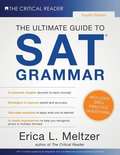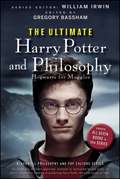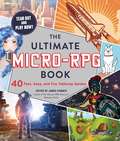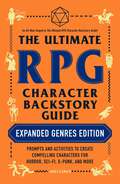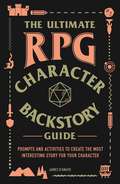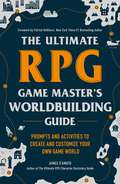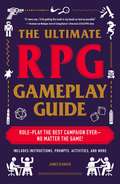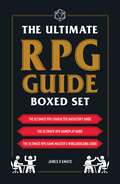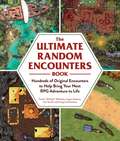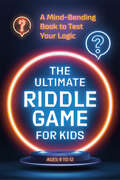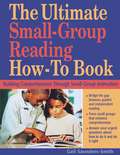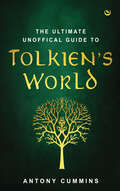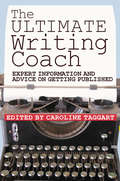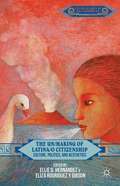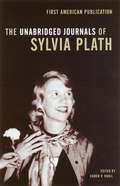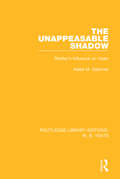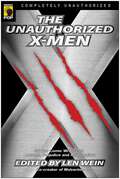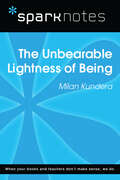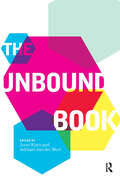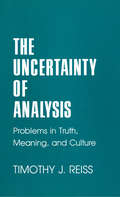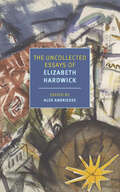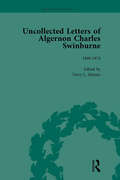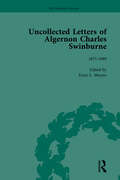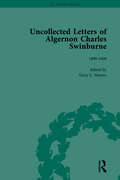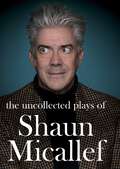- Table View
- List View
The Ultimate Guide to SAT Grammar
by Erica L. MeltzerThe fourth edition of The Ultimate Guide to SAT Grammar provides comprehensive coverage of all the grammar and rhetoric tested on the redesigned SAT Writing and Language Test. Dozens of exercises help students move from studying concepts individually to applying their skills in a passage-based context. Includes a complete index of Writing questions from the eight exams in the College Board Official SAT Study Guide, 2018 Edition, arranged both by category and by test.
The Ultimate Harry Potter and Philosophy: Hogwarts for Muggles
by William Irwin Gregory BasshamA philosophical exploration of the entire seven-book Harry Potter series Harry Potter has been heralded as one of the most popular book series of all time and the philosophical nature of Harry, Hermione, and Ron's quest to rid the world of its ultimate evil is one of the many things that make this series special. The Ultimate Harry Potter and Philosophy covers all seven titles in J. K. Rowling's groundbreaking series and takes fans back to Godric's Hollow to discuss life after death, to consider what moral reasoning drove Harry to choose death, and to debate whether Sirius Black is a man or a dog. With publication timed to coincide with the release of the movie Harry Potter and the Deathly Hallows (Part 1), this book will be the definitive guide for all fans looking to appreciate the series on a deeper level. Covers a range of intriguing topics such as the redemption of Severus Snape, the power of love, and destiny in the wizarding world Gives you a new perspective on Harry Potter characters, plot lines, and themes Makes a perfect companion to the Harry Potter books and movies Packed with interesting ideas and insights, The Ultimate Harry Potter and Philosophy is an ideal companion for anyone interested in unraveling the subtext and exploring the greater issues at work in the story.
The Ultimate Micro-RPG Book: 40 Fast, Easy, and Fun Tabletop Games (Ultimate Role Playing Game Series)
by James D’AmatoEnjoy these 40 expertly crafted micro-RPGs that are fast, fun, easy to learn, and come in a variety of genres—from space exploration to jungle dungeon crawlers—everything you need to pick up and play today. Get gaming fast with The Ultimate Micro-RPG Book including brand-new micro-RPGs created by experts across the gaming world. From space exploration to jungle dungeon crawlers this book has everything you need to pick up and play today. With these quick-start games, you can create your own adventures, alone or with friends, without any prep, and with minimal set up and pieces. Whether you&’re new to RPGs or working towards your level 20 mage, this collection is a great way to try out different games and systems, and test your roleplay skills on different character types and situations.
The Ultimate RPG Character Backstory Guide: Prompts and Activities to Create Compelling Characters for Horror, Sci-Fi, X-Punk, and More (Ultimate Role Playing Game Series)
by James D’AmatoTake your skyship pirate, haunted waif, or alien scientist to the next level with this fun, interactive book of exercises to help you build your RPG character&’s backstory—made specifically for the genres you love to play.You can now explore new RPG character ideas with this character backstory guide to the most popular RPG genres beyond fantasy, from sci-fi to horror and superhero to western-themed games. This latest guide from One Shot creator and RPG expert James D&’Amato helps you build out an existing character or create a new one, with these activities that provide plenty of RPG fun before you even hit the gaming table. With activities to help you flesh out characters for fantasy, sci-fi, horror, x-punk, superhero and western campaigns (with an extra chapter of neutral exercises you can use whenever you like), this book has everything you need, whether you&’re looking to start a new character, build out an existing character you&’re currently playing, or explore new character ideas and genres.
The Ultimate RPG Character Backstory Guide: Prompts and Activities to Create the Most Interesting Story for Your Character (The Ultimate RPG Guide Series)
by James D’AmatoRamp up your role-playing game and make your character your own with this fun, interactive workbook—an essential addition to any RPG player’s gaming kit.You’ve chosen your class, bought your weapons, and rolled for your stats, and you’re now the proud owner of your own RPG (role-playing game) avatar. But before you begin your adventure, there’s so much more you can do with your character to make him or her your own! Just how evil is she? What does his dating profile look like? Where did she get that scar? What does he want for his birthday? With fill-in-the blank narratives, prompts, and fun activities to help you customize your character at the start of the game, or build out your backstory as you play, The Ultimate RPG Character Backstory Book will help you fully imagine your character and bring them to life for the ultimate gaming experience!
The Ultimate RPG Game Master's Worldbuilding Guide: Prompts and Activities to Create and Customize Your Own Game World (The Ultimate RPG Guide Series)
by James D’AmatoLevel up your Game Master skills with these fun, interactive prompts and activities to help your worldbuilding from RPG expert James D&’Amato.Make your next campaign truly unique with the help of this interactive guide to world building! From RPG expert James D&’Amato comes a fun new guide that teaches beginner and experienced gamers alike how to build and create their own game elements for customizing existing adventures or creating new stories from scratch. The Ultimate RPG Game Master&’s Worldbuilding Guide includes dozens of activities for a wide range of genres from fantasy and sci-fi to horror and x-punk. This lively and interactive book helps Game Masters create dynamic destinations, powerful items, shadowy organizations, compelling villains, and more. Make the most of your gaming experience with these unique and personalized ideas for your gaming group&’s next adventures!
The Ultimate RPG Gameplay Guide: Role-Play the Best Campaign Ever—No Matter the Game! (Ultimate Role Playing Game Series)
by James D’AmatoImprove your RPG campaign with this comprehensive and interactive guide to making the most out of your gaming experience. Whatever RPG game you play, from D&D to Call of Cthulu to licensed games like Star Wars, every detail is important. From setting the scene to choosing the right music or even adjusting the lighting to create the right atmosphere, every choice helps maximize your gaming experience. The Ultimate RPG Gameplay Guide provides practical advice for everything from pre-game preparations and in-game improvisation to working out a plan of attack with your teammates to learning how to lean into the setting of your game. Including instructions, prompts, and activities, it offers everything you need for successful, fun role-playing with your friends every time you play. Create hours of narrative and make the most out of your storytelling skills by setting the perfect scene for your adventure. Whether you need advice on your character or working better with your gaming group, James D&’Amato includes everything you&’ll need to take your game to the next level.
The Ultimate RPG Guide Boxed Set: Featuring The Ultimate RPG Character Backstory Guide, The Ultimate RPG Gameplay Guide, and The Ultimate RPG Game Master's Worldbuilding Guide (The Ultimate RPG Guide Series)
by James D’AmatoA Simon & Schuster eBook. Simon & Schuster has a great book for every reader.
The Ultimate Random Encounters Book: Hundreds of Original Encounters to Help Bring Your Next RPG Adventure to Life (The Ultimate RPG Guide Series)
by Travis "Wheels" Wheeler Logan Jenkins Lee Terrill Greg LeathermanTake your gaming campaign to the next level with this inspiring, easy-to-use collection of random encounters perfect for any fantasy RPG.Spark your imagination fast with this collection of fun, engaging, and inspiring random encounter prompts. These expertly written options are organized into popular themes and locations so you can find what you need fast, whether you choose from the list or use the dice to choose randomly. With fantasy hooks to fit every game from Pathfinder to GURPS to D&D, there are options for all of your campaigns. Whether you&’re playing from a game book or weaving your own homebrewed adventure, there&’s always a need for short random encounters in between set pieces. Featuring fun full-color illustrations, you&’ll engage more in your story and bring your game to life!
The Ultimate Riddle Game for Kids: A Mind-Bending Book to Test Your Logic
by noneThe ultimate way for kids 9 to 12 to test their logic, unlock their creativity, and improve their lateral thinking skills!Full of mind-bending riddles, challenging brainteasers, math-based questions, and tricky wordplay, The Ultimate Riddle Game for Kids is designed to stimulate your child&’s imagination and improve their problem-solving skills. Irresistibly fun and stealthily educational, this book provides hours of brain-stimulating fun for 9-to-12-year-old kids who love a challenge. An exciting game for competitive kids. Whether your child is playing solo or with a friend, they&’ll head-scratch and laugh their way through these tricky riddles, while competing to get as many correct answers as possible. Quality family time away from screens. Age-appropriate riddles to stump each other around the dinner table, in the car, or any place you share quality time. Build confidence and resilience. The real game &“winner&” is the child who learns to work through tough problems as they gain confidence to try, fail, and pick back up again. Level up the challenge. The riddles in this book progress in difficulty and are organized into three chapters: 1. Quick Hitters: One-to-two-sentence riddles that require lateral thinking and often use wordplay. 2. Math Monsters: Revolving around numbers, some of these riddles involve actual calculations or logical deductions, while others center on wordplay or simply require a new way of thinking about how numbers can relate to each other. 3. Sneaky Stories: Each riddle tells a story and will require more time for kids to think about and work out the problem.
The Ultimate Small-Group Reading How-To Book: Building Comprehension Through Small-Group Instruction
by Gail Saunders-SmithAs students gain confidence and skills in guided reading, what is the next step to helping them become strong, independent readers? Small-group reading sessions. By working in small groups, students will be able to explore longer text and build their literacy skills with confidence. Literacy expert Gail Saunders-Smith demonstrates through the methods in this book how educators can advance students from small-group reading to silent reading, all while building reading comprehension.Ideal for teachers of emergent readers, The Ultimate Small-Group Reading How-To Book demonstrates how to develop successful readers through step-by-step, small-group reading instruction that focuses on vocabulary, comprehension, and fluency. Inside are tools for teachers to help them:Set up small-group mini-lessons and discussion of textsProvide tools for students to help investigate narrative textsEngage students to evaluate expository textsDevelop students’ skills in defining literary elements such as characters, setting, and plotAnd much moreHelp students become independent readers with these strategies for use before, during, and after guided reading!
The Ultimate Unofficial Guide to Tolkien's World
by Antony CumminsTolkien's Middle Earth continues to capture the global imagination. In this accessible (but unofficial) guide, this sometimes confusing world is broken down into bite-sized sections that bring it to life for the newcomer and the fanatic alike.Become an expert in Tolkien's world – the easy way! The Ultimate Unofficial Guide to Tolkien&’s World offers something that&’s never been attempted before: a single timeline, in chronological order, of all the events in Tolkien&’s notorious complex books.Why was it so shocking that Galadriel gave three strands of her golden hair to Gimli the Dwarf? Why is Sauron afraid of Aragorn&’s sword? Why does a Balrog lurk under a dwarven underground city and how did the seven lost Seeing Stones come into being? How did the hobbits manage to have such a peaceful life? Who were the warriors whose corpse lights hover in the Dead Marshes?From handy lists of characters, places, weapons and types of magic to the 150 illustrations capturing overlooked details such as armour colours, heraldic signs and crests, this easy-to-follow guide to Middle Earth will ensure you&’re never baffled by alternate character names, confusing mythologies or labyrinthine plots again.
The Ultimate Writing Coach: Expert Information and Advice on Getting Published
by Caroline TaggartThe Ultimate Writing Coach contains everything you need to know about writing and publishing. It presents authoritative guidance direct from professional writers covering the full gamut of both the fiction and non-fiction market. For fiction, there is coaching on everything from creating believable characters and writing short stories to specialist subjects such as crime and children's fiction. For non-fiction learn from expert advice on travel and technical writing, writing for the web, poetry and biographical writing, and journalism. This invaluable guide also includes succinct, practical guidance on actually getting published, with articles on how to get your submission right for immediate impact, contracts and legal issues, and the financial side.There are handy tips on learning opportunities, whether you're a high school graduate looking to embark on a university degree or a full-time mom looking to take a short course or workshop. And a handy glossary of book trade terminology will ensure you're fully clued up on your industry jargon.
The Un/making Of Latina/o Citizenship: Culture, Politics, And Aesthetics (Literatures Of The Americas Ser.)
by Ellie D. Hernández Eliza Rodriguez Y GibsonExamining a wide range of source material including popular culture, literature, photography, television, and visual art, this collection of essays sheds light on the misrepresentations of Latina/os in the mass media.
The Unabridged Journals of Sylvia Plath
by Sylvia PlathThe complete, uncensored journals of Sylvia Plath—essential reading for anyone who has been moved and fascinated by the poet's life and work."A genuine literary event.... Plath's journals contain marvels of discovery." —The New York Times Book Review Sylvia Plath's journals were originally published in 1982 in a heavily abridged version authorized by Plath's husband, Ted Hughes. This new edition is an exact and complete transcription of the diaries Plath kept during the last twelve years of her life. Sixty percent of the book is material that has never before been made public, more fully revealing the intensity of the poet's personal and literary struggles, and providing fresh insight into both her frequent desperation and the bravery with which she faced down her demons.
The Unappeasable Shadow: Shelley's Influence on Yeats (Routledge Library Editions: W. B. Yeats #3)
by Adele M. DalsimerYeats and his shadow are one of the most closely scrutinised pairs in contemporary literary history. The meaning and significance Yeats gave to the entity by which he was constantly pursued and with which he held frequent colloquy have been held under the critical microscope, and the shadow has emerged alternately as the course of human history, the poet’s alter-ego, his inner self, the natural man, or as anything that Yeats wanted but believed himself not to be. This title, first published in 1988, examines the influence that Shelley had on Yeats and this ‘shadow’. The study concentrates primarily on the complex influence of Shelley’s Alastor on Yeats, tracing the problems it suggests and the questions it raises from Yeats’s early, highly imitative poems through the austere, unromantic middle poems to the late poems where Yeats sees himself as the "last of the romantics". This title will be of interest to students of literature.
The Unauthorized X-Men: SF And Comic Writers on Mutants, Prejudice, And Adamantium
by Len Wein with Leah WilsonComic writers trace the X-Men series' evolution, challenge its metaphors, and draw from its truths about human nature and human society in this exploratory look at the still-timely and often-revamped classic. With chapters such as Magneto the Jew, The New Mutants and the Corruption of the Teenager, and The Sexuality of X-Men, the contributors highlight the strange ties between the characters and current society. From mutant subcultures in the real world to the reality of racism and heterosexism not so different from that of the world of the X-Men, this book takes on the intersection between fiction and truth in a manner perfect for long-time comic readers, cartoon fans, and Johnny-come-lately moviegoers.
The Unbearable Lightness of Being (SparkNotes Literature Guide Series)
by SparkNotesThe Unbearable Lightness of Being (SparkNotes Literature Guide) by Milan Kundera Making the reading experience fun! Created by Harvard students for students everywhere, SparkNotes is a new breed of study guide: smarter, better, faster. Geared to what today's students need to know, SparkNotes provides: *Chapter-by-chapter analysis *Explanations of key themes, motifs, and symbols *A review quiz and essay topicsLively and accessible, these guides are perfect for late-night studying and writing papers
The Unbound Book
by Joost Kircz Weel, Adriaan van derWhat might the digital revolution we’re currently living through mean for conventional paper books? Is there a future for the long-form text at all? At the onset of the digital deluge, books had evolved into the perfect reading machine. In the screen era, technology increasingly and emphatically foregrounds itself in the digital reading experience. It is one thing to identify what we lose in the process (which is a natural human tendency), but quite another and, it might be argued, an ultimately more fruitful one, to identify how that screen technology might shape the activities for which we always used to use paper. Screen technology is likely to determine our learning and entertainment habits. Indeed, the ‘industrial’ forms of reading that may be performed by the computer have a very tenuous relationship to what we have always understood by the term. Awareness of the issues, and eventually new insights, are essential if we want screen technology to offer a digital future to the long-form text.
The Uncertainty of Analysis: Problems in Truth, Meaning, and Culture
by Timothy J. ReissThe Uncertainty of Analysis pursues key issues raised in the author's earlier Discourse of Modernism, a ground-breaking work which focused attention on the nature of discourse and the ways in which one culturally dominant "discursive class" may be replaced by another. In this timely and provocative collection of his essays, Timothy J. Reiss shows how efforts to reconfirm the force and power of modernist, analytico-referential discourse in the late nineteenth and the twentieth centuries have actually brought to the fore internal contradictions, have made clear the problematic nature of the dominant discourse, and have precipitated the emergence of competing discourses.Reiss considers the explorations in foundational logic by Frege and Peirce; examinations of language and its relations to mind by Saussure, Greimas, and Chomsky; work in linguistic and scientific epistemology by Wittgenstein and Heisenberg; and the attempts to analyze the nature of society by Sartre and other Western Marxists. Reiss turns to some practitioners of literary criticism and theory who have sought to escape past constraints, and he points to what appear to be erroneous routes away from the dilemmas raised by these philosophers and critics.
The Uncollected Essays of Elizabeth Hardwick
by Elizabeth HardwickEssays on music, art, pop culture, literature, and politics by the renowned essayist and observer of contemporary life, now collected together for the first time. The Uncollected Essays of Elizabeth Hardwick is a companion collection to The Collected Essays, a book that proved a revelation of what, for many, had been an open secret: that Elizabeth Hardwick was one of the great American literary critics, and an extraordinary stylist in her own right. The thirty-five pieces that Alex Andriesse has gathered here—none previously featured in volumes of Hardwick&’s work—make it clear that her powers extended far beyond literary criticism, encompassing a vast range of subjects, from New York City to Faye Dunaway, from Wagner&’s Parsifal to Leonardo da Vinci&’s inventions, and from the pleasures of summertime to grits soufflé. In these often surprising, always well-wrought essays, we see Hardwick&’s passion for people and places, her politics, her thoughts on feminism, and her ability, especially from the 1970s on, to write well about seemingly anything.
The Uncollected Letters of Algernon Charles Swinburne Vol 1
by Terry L MeyersThese three volumes of letters by Algernon Charles Swinburne add approximately 600 letters by this poet that were not available when Cecil Y. Lang published his six volume edition of Swinburne's letters. The volumes also contain a selection of several hundred other letters addressed to Swinburne.
The Uncollected Letters of Algernon Charles Swinburne Vol 2
by Terry L MeyersThese three volumes of letters by Algernon Charles Swinburne add approximately 600 letters by this poet that were not available when Cecil Y. Lang published his six volume edition of Swinburne's letters. The volumes also contain a selection of several hundred other letters addressed to Swinburne.
The Uncollected Letters of Algernon Charles Swinburne Vol 3
by Terry L MeyersThese three volumes of letters by Algernon Charles Swinburne add approximately 600 letters by this poet that were not available when Cecil Y. Lang published his six volume edition of Swinburne's letters. The volumes also contain a selection of several hundred other letters addressed to Swinburne.
The Uncollected Plays of Shaun Micallef
by Shaun MicallefShaun Micallef is without doubt Australia's premier comedian, writer, producer, presenter, actor, author, broadcaster, bon vivant, gadfly, troubadour, dancer, impresario, acrobat, lion tamer, poet and elite sportsman. But did you know that he is also an internationally renowned playwright? No? Typical. It really is a stain on our national character that this doyen of theatre doesn't get the credit he deserves or attention he craves in this country - mute testimony to Australia's cultural cringe and inveterate idiocy. From Broadway to the West End, his name is mentioned in the same breath as Mamet and Ray Cooney; and in the salons of Paris Micallef is worshipped as a god. His plays, uncollected until now, are irrefutable proof that when it comes to listing the world's greatest dramatists, the name Micallef should be inserted in there somewhere. Even if you have never been to the theatre before, just holding this book in your hands as you are now will change your life forever. You'll laugh, you'll cry, your body will spasm convulsively and you may even be so moved that you will open the book and read it.
